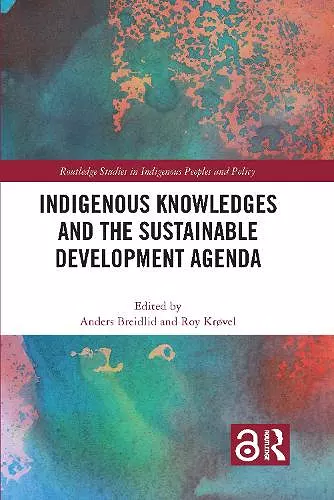Indigenous Knowledges and the Sustainable Development Agenda
Anders Breidlid editor Roy Krøvel editor
Format:Paperback
Publisher:Taylor & Francis Ltd
Published:13th Dec '21
Currently unavailable, and unfortunately no date known when it will be back
This paperback is available in another edition too:
- Hardback£145.00(9780367425968)

This book discusses the vital importance of including indigenous knowledges in the sustainable development agenda. In the wake of colonialism and imperialism, dialogue between indigenous knowledges and Western epistemology has broken down time and again. However, in recent decades the broader indigenous struggle for rights and recognition has led to a better understanding of indigenous knowledges, and in 2015 the Sustainable Development Goals (SDGs) outlined the importance of indigenous engagement in contributing to the implementation of the agenda.
Drawing on experiences and field work from Africa, Asia, Latin America and Europe, Indigenous Knowledges and the Sustainable Development Agenda brings together authors who explore social, educational, institutional and ecological sustainability in relation to indigenous knowledges. In doing so, this book provides a comprehensive understanding of the concept of "sustainability", at both national and international levels, from a range of diverse perspectives.
As the decolonizing debate gathers pace within mainstream academic discourse, this book offers an important contribution to scholars across development studies, environmental studies, education, and political ecology.
Editors Breidlid and Krøvel (both, Oslo Metropolitan Univ.) bring together diverse authors from within and outside academia in this collection. Taking the UN Sustainable Development Goals as its entry point, the book argues that, for the goals to be successful, Western ideas of sustainability and development need to be expanded to more fully include insights and perspectives from indigenous peoples and knowledge systems. Drawing on studies and experiences of indigenous people and sustainability from Europe, Africa, Asia, Australia, and Latin America, the individual chapters offer examples of collaborative research with indigenous knowledge holders, indigenous resistance to forces of ongoing colonization and displacement, and indigenous approaches to governance and ecological systems. As the editors convey, Western scholars are the book's principal intended audience, with the hope that it can encourage more authentic engagement with indigenous peoples and knowledges. With this framing, this volume will be of most interest to those focusing on indigenous knowledge, decolonization, political ecology, and development studies.
J. L. Rhoades, Antioch University, New England, USA
This book offers an important and contemporary contribution across disciplines aligned to Social Work. [...] Drawing on alternative global practices to tackle social exclusion and inequalities, especially from a decolonized perspective, will provoke social workers to incorporate sustainability to their practice and to think both globally and locally. Thinking this way could potentially inspire less constrained solutions to some of the future challenges the profession of social work faces.
Jill Childs, Department of Sport, Health Sciences and Social Work, Faculty of Health and Life Sciences, Oxford Brookes University, Oxford, UK
ISBN: 9781032236728
Dimensions: unknown
Weight: 460g
250 pages